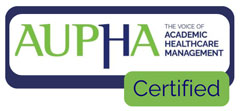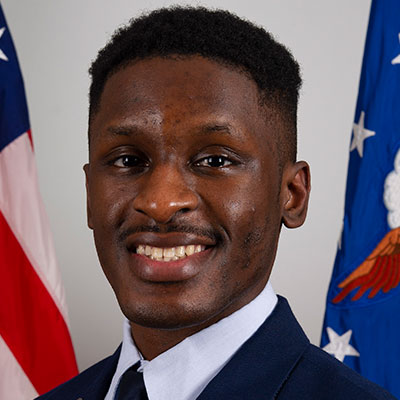The Bachelor of Science in Health Services Management features a curriculum that focuses on the business side of healthcare, integrating management and finance skills with healthcare strategy, training you in management, healthcare finance and budgeting, human resources, marketing and communication, organizational leadership, strategic planning, and U.S. health policy.
Sharpen your expertise in the growing health care industry
With this degree you will be prepared for entry-level positions in a variety of healthcare settings and health-related companies. Your grounding in business foundations will also prepare you to pivot your career at any point.
Video: Learn more about the HSM degree
Description of the video:
Do you see yourself working in a healthcare delivery setting? Do you want to improve healthcare outcomes? Then you are ready to begin your career with a Bachelor of Science in Health Services Management. Imagine blending your passion for healthcare with essential business skills. In this major, you'll explore the dynamic intersection of healthcare and management. From mastering leadership techniques to understanding finance, marketing, and quality assurance, you're going to gain a holistic view of how we deliver care. Healthcare is booming. It's one of the fastest growing sectors in the U.S. economy. And guess what? The demand for professionals who bridge healthcare and business is also growing. As a health services management graduate, you'll be employed by hospitals, insurance companies, and innovative health-related startups alike. Our graduates work in a wide variety of positions across the healthcare industry. You'll also have unparalleled opportunities to network, gain experience, and grow your career. Forget textbooks alone. You're going to roll up your sleeves and dive into real world scenarios provided by professionals working in the field. You're going to gain hands-on training in a healthcare internship, and you will regularly have the chance to learn from and network with alumni. With the largest healthcare administration alumni network in the state, you will never want for connections that can open doors, spark ideas, and propel your career forward. Thinking globally? Our study abroad programs explore healthcare systems worldwide. Compare the U.S. healthcare system with others, gain fresh insights, and broaden your horizons. Who knows, you might discover groundbreaking solutions along the way. Join us and step into a future where you are not just managing healthcare, you're transforming it. Together, let's shape the future of healthcare here in Indiana and beyond.
Jobs outlook
#7Rank among 100 Best Jobs of 2025 by US News
$104,830Median Salary for experienced Health Managers in 2024
28%Job growth outlook, 2021-31
$40-50kTypical Starting Salary
Career options and internships
Employment opportunities for health services management graduates are projected to grow 32 percent between now and 2030, which is much faster than the average for all occupations according to the Bureau of Labor Statistics. After gaining skills and experience in a health care internship, our graduates go on to work in a wide variety of health care settings.
| With this degree, your job title might be: | You might work at places like: |
|---|---|
| Medical Office Manager | Hospitals and Health Systems |
| Long-Term Care Administrator | Medical Practices |
| Budget and Reimbursement Analyst | Home Health Companies |
| Patient Access Specialist | Nursing Homes and Rehabilitation |
| Physician Recruiter | Centers |
| Hospital Administrator | Insurance Companies |
| Home Healthcare Director | Pharmaceutical, Medical Device, or Medical Services |
| Pharmaceutical Sales Representative | Companies |
| Human Resources Specialist | Dental Practices |
| Healthcare Marketing Specialist | Doctor’s Offices |
| Nonprofit Program Coordinator | Health-Related Nonprofit Organizations |
| Hospital Project Manager | Government Agencies |
| Patient Experience Specialist |

I wish people knew the depth there is to health administration. There is so much you can do.
Mitch Mastey, BSHSM'19
Curriculum and quality
The Health Services Management program recently updated its curriculum to better meet the needs and demands of the current healthcare market.
To complete this degree, you will take a combination of general education courses and major courses that total at least 120 credits.
The Health Services Management program is the only Association of University Programs in Health Administration (AUPHA) certified bachelor’s program in the state of Indiana. To earn AUPHA certification, the program underwent a rigorous review of curricula, faculty, and educational outcomes. This program meets the highest standards for an educational program in health services management.
Description of the video:
Description of the following video:
[Video: Background music begins.]
[Video: Opening Title: IU Indianapolis, Indiana University, Richard M. Fairbanks School of Public Health]
Sarah Johnson speaks: I think most people see healthcare as the clinical practitioner side – you’re a nurse, you’re a doctor…
[Video: Person is walking on a skybridge between two buildings]
[Words appear: Health Services Management Curriculum Highlights]
[Video: Person walking into the Health Sciences building]
Sarah Speaks: but people don’t always think about what’s happening behind the scenes and that’s really what Health Services Management is all about…
[Video: people walking in the halls of a hospital]
[Video: Sarah sits and talks at the camera]
[Words appear: Sarah Johnson, HSM Program Director]
Sarah Speaks: Health Services Management curriculum really focuses on the core concepts of business:
[Video: Shows Dr. Nir Menachemi teaching in one of his classes.]
Sarah Speaks: management, strategic planning, leadership, ethics, but you learn about those business concepts through the lens of healthcare.
[Video: Shows Dr. Josh Vest in his classroom setting talking to his students]
[Words appear: What was your favorite Health Services Management course?]
[Video: Shows Jay Patel sitting on a couch talking]
[Words appear: Jay Patel, Student, Organizational Behavior and HR Course]
Jay speaks: Organizational Behavior dives into how to effectively manage individuals, teams, or the organization institute itself
[Video: shows Dr. Mazurenko on a couch in a conference room]
[Words appear: Dr. Olena Mazurenko, Instructor, Organizational Behavior and HR]
Olena Speaks: This course talks specifically about why people behave a certain way in their organization and what can we do about it.
[Video: Goes to Olena’s class and students are working at computers. Then we see them sitting at their desks taking notes.
Olena Speaks: We talk about teamwork, we talk about leadership, how to manage conflicts and be a good negotiator…
[Video: We see a student talking with someone in Student Services and they are laughing together.]
[Video: Pans back to Olena on the couch talking]
Olena Speaks: So I think those are all the skills that every single health care administrator needs to have.
[Video: Shows Dr. Johnston on a couch in a conference room speaking]
[Words appear: Dr. Ann Johnston, Instructor, Health Systems Administration]
Ann Speaks: It’s a foundational course at an upper level. So they’ve had an introduction to the U.S. healthcare system, but we take a deeper dive into each of the components, but specifically with what’s going on with current events and the Affordable Healthcare Act.
[Video: Pans back to student, Jay Patel, sitting on a couch talking]
Jay Speaks: I like the hands-on learning piece, the experimental side of that. Um, every class session will do some kind of activity and then will tie that back into the real world.
[Video: Pans back to Dr. Josh Vest’s class and him teaching up at the front while pointing to the whiteboard]
[Words appear: What was our favorite Health Services Management course?]
Taylor speaks: Definitely Healthcare Information Technology course. I say that because…
[Video: Shows a conference room where Taylor is sitting talking to the camera]
[Words appear: Taylor Driver, Student, Healthcare Information Technology course]
Taylor speaks: healthcare is forever evolving and is changing.
[Video: Shows Dr. Nir Menachemi in his classroom teaching to students sitting at tables listening to him.]
Taylor speaks: I was not aware of, um, how big of an impact technology played in healthcare prior to taking this course
[Video: goes back to the conference room where a student is speaking to the camera]
[Words appear: Micah Fischer, Student, Practicum/Career Preparation Course]
Micah speaks: I would definitely say that my favorite class would be Sarah Johnson’s Practicum class. It put things into perspective for me.
[Video: pans to a classroom with students sitting at a computer talking with Rachel Forster, Associate Director of Undergraduate Education & Recruitment.]
Micah speaks: It allowed me to realize what this career really had to hold for my future.
Naqeeb speaks: If you’re a senior or even a junior, it gets you ready for the real world, like how to look for jobs…
[Video: shows a student in a room talking to the camera]
[Words appear: Naqeeb Rahman, student, Practicum/Career Preparation Course]
Naqeeb speaks: how to prepare your resume, and how to tailor it for the specific employer that you’re submitting it to.
[Video: pans back to Sarah Johnson in a conference room speaking to the camera]
[Words appear: Sarah Johnson, Instructor, Practicum/Career Preparation Course]
Sarah speaks: Students are exposed to a healthcare career explorations course early on in the curriculum that exposes them to all the different functional areas within healthcare that they might want to consider as a future career path.
[Video: Shows five students walking side-by-side down a hallway, talking, and laughing]
Sarah speaks: That’s done early because that then allows students to focus on their elective credits.
[Video: Pans to a student talking to Dr. Carole Kacius, Associate Dean for Education and Training in the School of Public Health]
Sarah speaks: So if you’re inspired by marketing, you can take the marketing class, if you’re inspired by long-term care, you can take that elective class.
[Video: Shows a student in a conference room sitting at a table talking to the camera]
[Words appear: Trevor Cunningham, Student]
Trevor speaks: Here at the school of public health, we actually have specialized programs in classes that are targeted towards health-related topics.
[Video: Pans back to Sarah Johnson in her office talking to the camera]
Sarah speaks: So we really do care about students figuring out what it is that they want to do early on, gaining the right experience for whatever that is in the middle of the program, and then making sure they are fully prepared to enter the workforce that final year.
[Video: pans to the final white screen with writing: IU Indianapolis, Indiana University, Richard M. Fairbanks School of Public Health]
[END OF TRANSCRIPT]

Accelerate your degree
Earn your BS in Health Services Management and your Master's in Health Administration in just five years!
- Achieve your academic and professional goals in less time
- Save yourself thousands of dollars
- Skip the GRE
- Join the largest alumni network in the state
Apply for scholarships
If you are a Health Services Management major, you are eligible to apply for a variety of scholarships. The program offers scholarships for freshmen, sophomores, and students completing internships.
Alumni and student spotlights

Alumni profiles
Our BSHSM alumni share the career opportunities they have had since graduating.
View our alumni profiles
Student spotlights
Our BSHSM students share their goals and aspirations for a career in health administration.
View our student spotlightsFaculty
The Health Policy and Management department is comprised of a renowned, award-winning and connected faculty. Faculty are researching how organizational strategies impact patient care, financial performance, and patient satisfaction. Faculty are experts in the health information exchange, health law, food deserts, mental health, homelessness and housing, and substance misuse.
View the Health Policy & Management facultyAdmissions
Apply
Learn what you must complete in order to be admitted to this degree program.
View the admissions criteriaStill have questions?
Reach out to us at fsphinfo@iu.edu if you seek assistance or have any questions.


